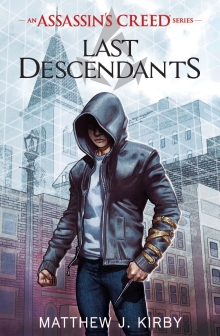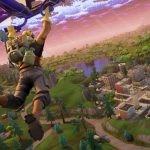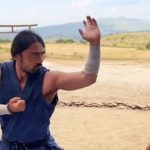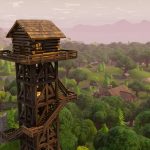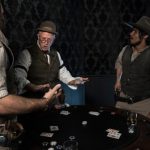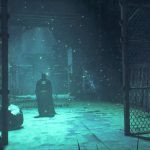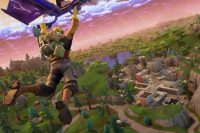Assassin’s Creed Last Descendants – Q&A With Author Matthew Kirby
by Mikel Reparaz | Editor | on
The first volume of Last Descendants, the young-adult novel series set in the Assassin’s Creed universe, invites readers to discover two parallel storylines: the first centers on modern-day teenagers Owen and Javier, who head an ensemble cast of kids brought together to jointly experience the past through a stolen Animus. The second is an interweaving narrative that focuses on their ancestors in the gang-ridden New York of 1863, on the eve of the draft riots. These dueling plotlines were written by Matthew J. Kirby, an award-winning author (and Assassin’s Creed fan) and former school psychologist whose works include The Clockwork Three, A Taste for Monsters, and Icefall. With Last Descendants on shelves and the second book in the series slated for a January release, we asked Kirby about how he crafted the book’s dive into history.
 What was the starting point for creating Last Descendants’ historical setting? Where was the initial spark?
What was the starting point for creating Last Descendants’ historical setting? Where was the initial spark?
Matthew J. Kirby: When I was first approached to write the series, I had always wanted to take Assassin’s Creed to London, during the Victorian era, because I wanted to get some subtle steampunk elements in there. I wanted a steampunk Hidden Blade, like the Assassin gauntlet, just as a fan. But then I immediately thought, “No wait, that’s probably where they’re going with the next game.” They had not announced Syndicate yet, [but] I was pretty sure that I was correct in my prediction, that the next game was going to go to Victorian London, and so I started thinking, “Wouldn’t it be cool to have a companion narrative that’s looking at sort of the same period of time, but on the other side of the Atlantic Ocean?”
In looking at that period of time, I was really drawn to the same narrative possibilities that drew game developers to London, and that is street gangs, the potential for riots, and these larger-stakes questions and conflicts playing out on the street. And I was sort of a fan of that period in history, in terms of the gangs of New York, and the draft riots were a really pivotal time in American history. Once I’d settled on taking that initial idea I had across the ocean, it didn’t take long to zero in on New York City in 1863, and take it from there.
What was the process of creating the original characters in Last Descendants and connecting them to characters from the games?
MJK: From the very beginning, I was given the opportunity to allude to, or make reference to, or have some Easter eggs for fans of the games. I always really liked the character of Shay Cormac, and I thought Rogue was really great. It’s too easy to slot the Assassins and the Templars into the good and evil camp, where the Assassins are the good guys and the Templars are the bad guys. The thing that drew me to Assassin’s Creed as a writer is the fact that the line between good and evil is not that clear. Both of these groups want the same thing, they just go about it differently, and I think both groups are susceptible to abuses of power and mistakes.
I was really intrigued with Rogue, because it’s from the perspective of a Templar, and I wanted to bring that into the book. I kind of knew that I wanted to have a Templar character who was sympathetic, and for me, having [Cudgel Cormac] be a descendant of Shay Cormac, with this tradition behind him, felt like a really cool way to go about that. And then I had to have a counterpoint to that in Varius, someone who also comes from a long tradition [of Assassins] and bears that responsibility and burden. They’re very similar characters, because they both have something they have to live up to. In some ways their conflict on an individual level represents the larger conflict between these two groups.
It’s interesting that you mentioned the steampunk Hidden Blade, because you make a point in the book of establishing Varius’ preference for the classic model. What’s the story there?
MJK: I didn’t want to take anything from Syndicate. I really like the Syndicate gauntlet, but didn’t want it to feel like the book was derivative in that way. When it was coming time to write that character, it didn’t feel like he would go for any of that stuff. It just didn’t feel like it would be his character, even though it might be mine. I wanted to stay true to what he would use, just in his approach to his mission and his purpose.
 Was it a challenge to develop the two parallel narratives and weave them together?
Was it a challenge to develop the two parallel narratives and weave them together?
MJK: It was, because this is the first book, and it’s a large cast, and you don’t want to slow the narrative down. You want to keep it moving and keep it exciting, so that the reader wants to just keep turning pages. The real challenge was trying to introduce the characters in a way that you cared about them in the modern-day storyline before they dove into the past. I didn’t have as much time, because when people come to Assassin’s Creed, one of the things they’re really looking for is that amazing historical setting. I wanted to get to that as quickly as possible while still giving readers the sense of who these characters are before they go in.
The other challenge is to make what they learned in their experience in the past, in the memories of their ancestors, relevant to the modern day. That was something else that was on Ubisoft’s wish list; the Animus isn’t time travel. We can’t actually change what happened in the past, so what purpose does it serve? In that situation, the history you get to experience is only as important as how it affects the present. And so in that way, those two storylines really have to intimately connect. There have to be consequences for the characters on a personal level, but also on a story level. There have to be consequences for their experience in the past in the present day. And that becomes even more complex and interesting, I think, in the second book.
What was your method for researching the setting? How much did you have to discover?
MJK: I had a general understanding of that time period, but my working knowledge of the United States during that period was not as detailed as my knowledge of Victorian London. Moving it to New York City meant I had to do more research. But I love the research, actually. In terms of my process, I tend to search for primary sources first of all. Journals, newspaper articles – things that were written at the time by people going through it, just to get a sense of how they saw it. You can get facts and so forth from modern historical summaries, but for something as complicated as the draft riots, it’s very easy, with the time that we have, to look back on it and interpret it through a particular lens. But where these characters are experiencing something as people of the time, I felt like it was really important to portray how the people at that time saw it, rather than how we see it.
I was able to get some of that in, because you have modern characters looking back. That’s one of the things that fascinates me about Assassin’s Creed: the lessons of history can really play out, because you have these modern characters with our sensibilities going through something, through the perspective of someone from that time with a very different sensibility. And I think the contrast between the two of those can be really interesting.
Was there anything that surprised you while you were researching?
MJK: The Aztec Club was really fascinating. I kind of wrote myself into a bit of a corner, because I started the book – because of Javier’s background – with the fall of the Aztecs, with Tenochtitlan and Cortés. But then somehow I had to get that Piece of Eden up to New York, and I had no idea how I was going to do that. That was the corner I’d boxed myself into. As I was reading and researching about Mexico City and its history after the fall of the Aztec Empire, and then the Mexican-American war… oh my gosh, there’s this club that could have a whole different purpose or function that history hasn’t recorded! That was really surprising to me, and really fortunate to help resolve that aspect of the plot.
Honestly, in all my books, particularly the ones that have historical settings, I find that history usually provides the answer. I have a lot of those surprises that come up, and in retrospect it almost looks like it was meant to be that way, that it was written with that intent, but often it’s not. Often it’s just the amazing record that is history, and all the different characters people and groups and events – that’s one thing I love about history, actually.
Was there something about the games that was particularly important to preserve in the books?
MJK: Some of the more aesthetic aspects, in terms of the parkour and free running, the sense of action and the sense of forward momentum tied together with the narrative – all of that was important, but the things that drew me as a storyteller are things that the games have touched on, but can’t quite explore in the same way that a novel can.
One of them I already mentioned, which is the idea that neither of these groups can be totally dismissed as good or evil. They’re very different in how they’re going about the same mission. But the difference at the heart of their conflict, this free will vs order, that is really fascinating to me. It’s really easy to say, “I’m the champion of free will” until someone is going to use that free will to hurt someone you love. And then suddenly maybe you don’t want that person to have the free will, maybe that’s too high a cost, and maybe there should be some limits on his free will. It’s not a very easy question to settle. I think that’s why the conflict between the Assassins and Templars has been waged for millennia.
Another one that they got at a little bit with Desmond Miles is this idea that you have this past, this history, in your DNA, but what does that mean about you? What does that mean about who you are, and the choices that you make? I was really interested – and this was perhaps the psychologist in me – I work with kids who come from terrible homes, and they’re kind of struggling with this question themselves. Like, “I want to make different choices than other members of my family have made. I don’t want to end up like them.” And those kinds of challenges and feelings and doubts, I thought, were also really important to preserve when I was approaching this in the book.
That’s why each of the characters in the novel, they’re being called upon to choose a path, whether it’s with the Assassins or the Templars. Some of them come from Assassins or Templars, and what does that mean for which side they choose? Can they choose their own way, or are they somehow bound to where they come from? And again, that’s not an easy question to answer either. Sometimes the most complicated questions are the best ones to take up in a book and really get to explore them.
For more from Matthew J. Kirby, visit his blog, Kirbside. The first volume of Last Descendants is available now; for more on the book and other upcoming Assassin’s Creed projects, check out our previous coverage:
Assassin’s Creed Fans Get A Sneak Peek At Last Descendants Novel At Comic-Con
Ubisoft In-House Publishing Team Brings New Assassin’s Creed Books To Life
Assassin’s Creed Movie – 6 New Shots of Parkour, Templars, and More
The post Assassin’s Creed Last Descendants – Q&A With Author Matthew Kirby appeared first on UbiBlog – Ubisoft®.
(57)

